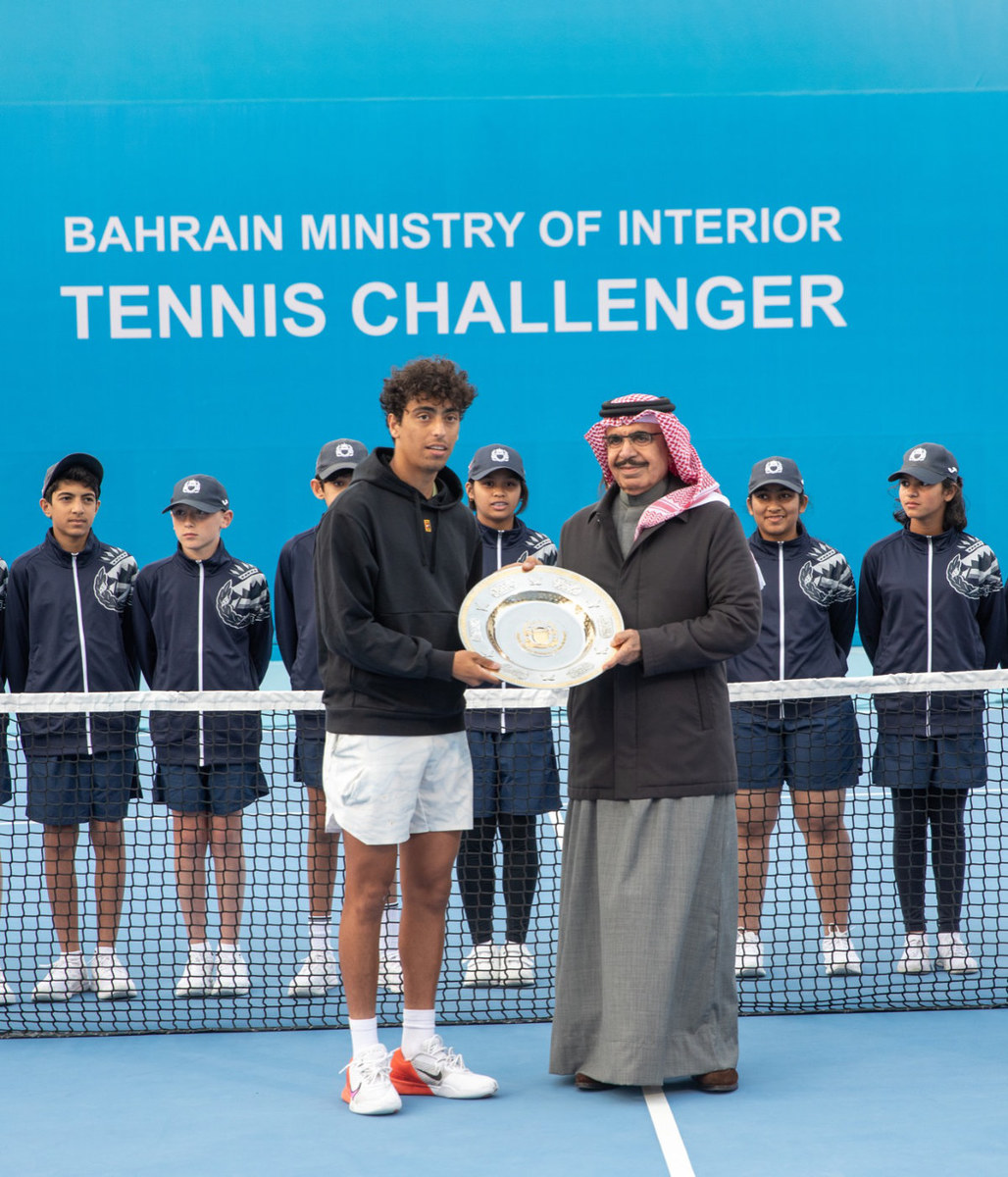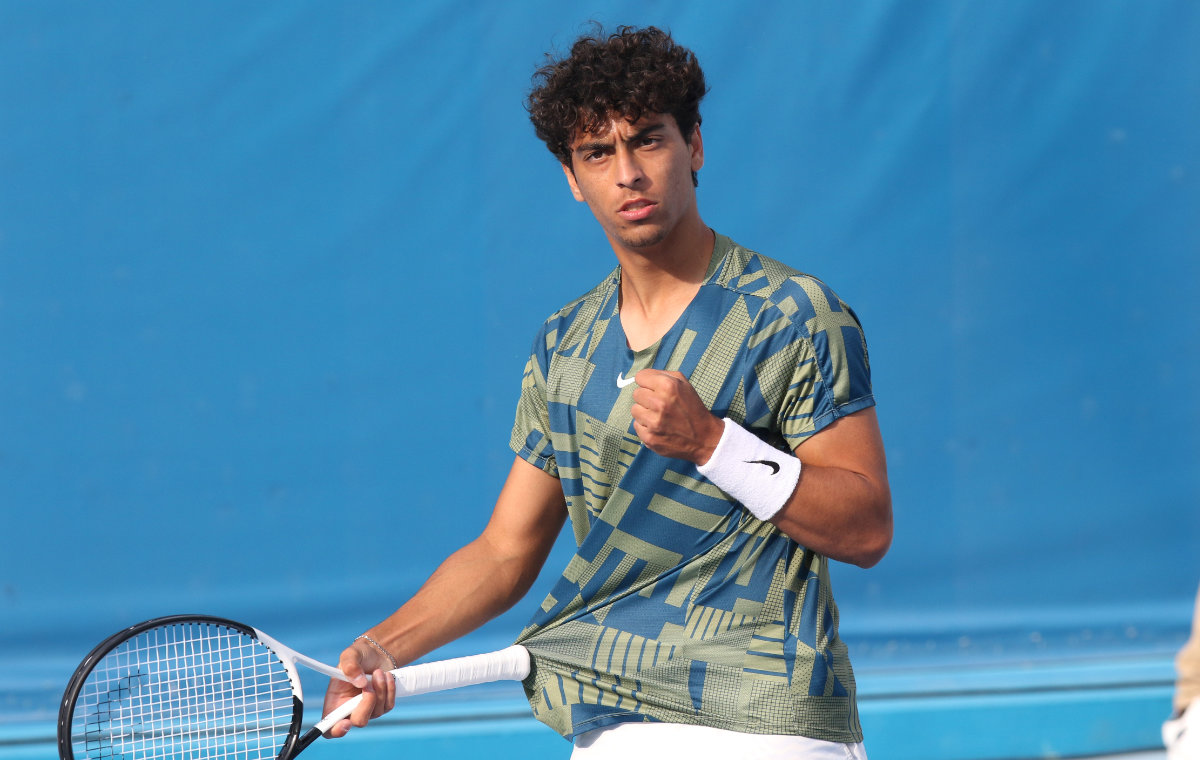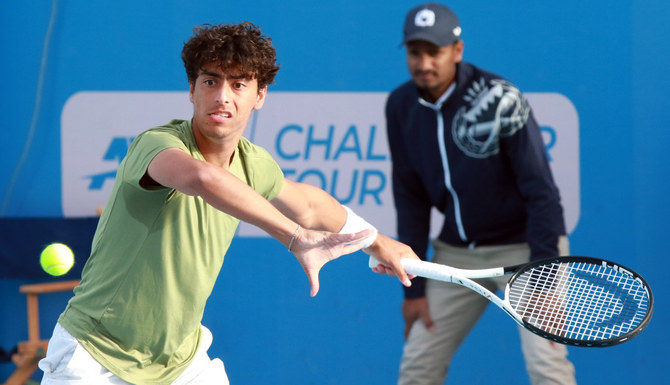When Abdullah Shelbayh decided to turn pro last May after giving college a try for a year, he probably could not have predicted that he would rise from 1,293 to 276 in the rankings within the span of nine months.
With no match-play under his belt between October 2021 and June 2022, Shelbayh quickly shook off the rust and enjoyed a strong start to his professional career, winning two of his first five ITF tournaments last year before making the semifinals on his Challenger Tour debut in Mallorca.
It was a week in Bahrain last month, however, that proved to be truly life-changing for the 19-year-old Jordanian. Competing in just his third Challenger tournament of his career, and ranked 399 in the world, Shelbayh battled his way through a tricky draw to become the youngest Arab in history to reach the final of a Challenger Tour event.
En route to the championship match, the teenage lefty knocked out world No. 79 Jason Kubler in the quarter-finals to post his first victory over a top-100 opponent and walked away from Bahrain with a runner-up trophy, 75 valuable ranking points and a career-high mark of 276.
Two days later, he made his ATP tour debut thanks to a wild card into the Qatar Open main draw and fought valiantly in a three-set defeat to world No. 68 Kwon Soonwoo.
“I thought it was going to take more time to adapt (to the higher level at Challengers and ATP events) but since I played my first Challenger in Mallorca in August, I started believing in myself more,” Shelbayh told Arab News in a Zoom interview from Miami, where he was handed a wildcard for this week’s qualifying draw of the prestigious ATP Masters 1000 tournament.
“I knew I had the level but it was about keeping it more consistently, because that’s what it takes in order to keep on jumping up in the rankings.

Abdullah Shelbayh receiving the runner-up trophy in last month's Bahrain Challenger Tour event. (Photo Courtesy of Bahrain Ministry of Interior)
“I went to Doha with a lot of confidence.”
A natural-born competitor, Shelbayh is the first player from Jordan to reach this level in the sport. Coming from a country with little tennis tradition did not stop him from dreaming big from a very young age.
He was introduced to tennis courtesy of his father, who played recreationally, and trained in Jordan until he was 14 before moving to Spain.
“Competition is in my blood, I’ve always been competitive, I’ve always wanted to do better than others. Some things are natural and I was lucky to be able to be that competitive, and always ask for more,” Shelbayh said.
“It’s good to be ambitious. I’ve always seen myself competing with those (top) guys when I was a kid and that’s why I started playing tennis. I never really played tennis just because — I mean of course I love the sport and everything but it was never like I’m playing because I just enjoy it, it’s because I also believe that I could be competing one day with those guys.
“I’m still not there, but I hope I’ll be there more often very soon. I know it’s not going to be easy but I’m willing to work for it, I’m willing to do whatever it takes, no matter if it takes two months, one year, whatever. I’ll always give my best and wait for the right moment.”
The Rafa Nadal effect
In 2018, Shelbayh and his family made a decision that would change the course of his life; they sent him to the Rafa Nadal Academy in Mallorca, Spain.
It was with the help of Princess Lara Faisal, who sought out Toni Nadal, Rafael Nadal’s uncle and former coach, to come to Jordan and see if Shelbayh had what it took to join the academy.
Toni Nadal confirmed what everyone had been saying about Shelbayh, that he was a promising young talent who needed to be developed in the right way. That inspired Princess Lara to set up the Rise for Good Sports Fund to help Shelbayh and other gifted prospects pursue their dreams in sport.

Abdullah Shelbayh, the youngest Arab to reach the final of a Challenger Tour event. (Photo Courtesy of Bahrain Ministry of Interior)
“We have so much talent in the Arab world but we don’t equip our talents with the right tools and experience to achieve their highest potential,” said Princess Lara in an email interview.
“Sports, music, the arts, they are all still considered extracurricular in our part of the world, almost a luxury, their power and importance to the progress and development of a society is underappreciated.
“Here was a young boy that had so much potential but just needed a little help. I was in a position to help him. So I did. Best decision I ever made. I’ve been with Abboud since, and I hope to always by by his side on this journey.”
Moving to Spain at such a young age was no easy transition for Shelbayh, but it also gave him a dream opportunity to come up close and personal with his idol Rafael Nadal. Shelbayh switched to being left-handed in tennis when he was young just to emulate Nadal — they are both naturally right-handed — and suddenly he was at the 22-time Grand Slam champion’s academy, receiving elite-level coaching and sharing the court with Rafa and Toni during practice sessions.
“At a young age, meeting my idol, and having the chance to practice with him many times and speak to him. Be able to ask him things, him telling me the things I need to change, things I would need to do in order to reach the top level, is a unique thing honestly,” Shelbayh said.
“I was fortunate enough to have that. It’s something I can never replace.”
‘I had to get out of my comfort zone’
In a docu-series about the academy, shot in 2020 and released on Amazon Prime, Toni describes Shelbayh as a “natural talent,” while Carlos Costa, Rafa’s agent, says he’s “creative.”
Rafael Nadal predicted that the Jordanian was “highly likely to make a living from tennis” but added that “he’s still a bit disorganized and the objective of the people around him, and his as well, is to organize all that talent.”
Toni noted that “Abdullah has a problem. He trains well one time out of . . . I can’t even say how many. In the end we have to change that.”
Three years on from the days of filming that documentary, Shelbayh says he is a changed man and assures that he has taken the time to mature and find his way.
“In tennis, in any sport, you need to be mature enough. That’s why I had to get out of my comfort zone, change many things, and I’m happy that I managed to change that at quite an early age I would say, since it’s not an easy thing to do,” Shelbayh said.
College vs the pros
Spending a year at University of Florida proved to be the change of scenery that Shelbayh needed. He didn’t get a chance to play any college tennis while he was there, which fueled his hunger even more.
“Going to college was a last-second thing, I signed with them when I didn’t know how my last year of juniors was going to go, I didn’t really feel well on court. I had some personal issues, so it was a way to disconnect and change things up and get out of my comfort zone a bit,” he said.
“I didn’t have the chance to play, which annoyed me; which is normal, it would annoy any player honestly, but it kind of pushed me to work harder. After the (academic) year, in June 2022 I went back to Spain to Mallorca to the academy and there I said I’m going to keep doing whatever I can do in order to go pro, because that’s the reason I started playing tennis.
“I found myself mentally in a better place by the end of my college year.
“It was not easy to leave college because you never know if it’s the best decision or not, but I went with my heart and realizing that’s why I started playing tennis, to go pro. I had a good summer and that encouraged me even more to just, like, say: OK, I’ll do online, I won’t stop studying until I finish, but I’ll go pro.”
‘I was brave enough to change’
Shelbayh’s impressive results on the pro circuit have helped reassure him that leaving the University of Florida was the right call for him. He has taken the necessary steps to improve his overall approach to the sport and his work ethic has significantly improved.
Asked what triggered his decision to step up, Shelbayh said: “I think seeing other people doing better than me when everyone around me, in terms of tennis experts, like Rafa Nadal himself, Carlos Moya, Toni Nadal, all of them say how much talent I have and how much better I could be already at that age by just changing some things.
“Seeing others do well and I’m like, ‘I can do that too, why can I not do that?’ I asked myself a lot of times, ‘Why?’ That’s the thing that helped me change. It took a lot of courage.
“I don’t think it was an easy thing. I was brave enough to admit that I had to change when I was young because I could have kept fighting against it, saying I have time, I have time. That could have ended my career early, could have changed many things, who knows . . . I’m happy I changed at the right time.”
The Jabeur connection
Shelbayh is one of three Arab men ranked in the top 300 and is the youngest of the lot.
He opens his Miami Open qualifying campaign this week against Christopher Eubanks of the US.
The only other Arabs in action in Miami are on the women’s side, with Tunisian Ons Jabeur seeded No. 4 and Egyptian Mayar Sherif a direct entrant into the main draw.
Shelbayh and Jabeur have an interesting connection in that they were both coached by Rafik Bouchlaka in their formative early years as tennis players.
Jabeur, a Wimbledon and US Open finalist and former world No. 2, spent about two years working with Bouchlaka in Tunisia and she credits him for making significant improvements in her game as a youngster, while Shelbayh trained with him in Jordan between the age of nine and 14 before moving to Mallorca.
“He was a very important part of my tennis career,” said Shelbayh of Bouchlaka.
“He helped me a lot through my early years. He always gave me examples of how Ons worked and how bad she wanted it and everything. Ons was his example always, which motivated me a lot.
“And now, it’s great to have someone like her in the Arab world being at the top of the game. She motivates all of us, I can speak for myself and everyone else honestly, it’s something incredible to have that, first time ever, to have someone that high in the ranking, it’s unbelievable. I hope I can be there as well and I hope I can learn a lot from her.”
Shelbayh’s target for the rest of the season is to compete in all three remaining Grand Slams — Roland Garros, Wimbledon and the US Open — and to finish the year ranked inside the top 150.
“It’s a long way, it’s not easy, but I feel like I’m capable of doing that,” he said.
‘I hope I can make my country proud’
He has a solid team in place with his coach James Allenby from the Rafa Nadal Academy traveling with him, Princess Lara supporting him, and he recently signed with IMG’s Mats Merkel to be his agent.
The whole team at the academy consistently lend their support, and the likes of Toni Nadal, Carlos Costa and Carlos Moya were messaging him throughout his statement run in Bahrain last month.
Being the sole representative from Jordan in the world of tennis, Shelbayh is already setting records for his country with every significant milestone.
“It’s something great, it’s a pleasure honestly. There is pressure at the same time but it’s good pressure, I take it in a good way,” he said.
“I like pressure and I feel like every athlete needs some pressure. There is pressure of trying to always keep up the good image. Jordan is not known for tennis, not even many sports; so to be the first in many things is an honor for me to represent my country in every tournament that I play and trying my best to represent it in the best way possible.
“I hope I can make my country proud.”
He’s well on his way to achieving just that. Many would argue he already has.















